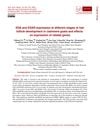
Search
for
Sort by
Research
810-840 / 1000+ results

research COVID-19 Dermatological Manifestations: Results from the Mexican Academy of Dermatology COVID-19 Registry
COVID-19 can cause skin issues like hives, rashes, and chickenpox-like eruptions, with women aged 31-40 being the most affected.

research Novel Type 1 5a-Reductase Inhibitors With Antiproliferative Potential On LNCaP Cells
New compounds may help treat prostate cancer by reducing cell growth.

research Dermatomyositis Disease in Dogs
Dogs with dermatomyositis, especially Collies and Shetland Sheepdogs, need better treatments for their skin and muscle inflammation.

research APCDD1 Is a Novel Wnt Inhibitor Mutated in Hereditary Hypotrichosis Simplex
A gene called APCDD1, which controls hair growth, is found to be faulty in a type of hair loss called hereditary hypotrichosis simplex.

research New Activators and Inhibitors in the Hair Cycle Clock: Targeting Stem Cells’ State of Competence
The conclusion is that Fgf18 and Tgf-ß signaling could be targeted for hair loss treatments.

research Neuroactive Gonadal Drugs for Neuroprotection in Male and Female Models of Parkinson's Disease
Some hormone-related drugs may protect brain cells in Parkinson's disease differently in men and women.

research Exploring the Brain-Skin Connection: Leads and Lessons from the Hair Follicle
Hair follicles on the scalp interact with and respond to the nervous system, influencing their own behavior and growth.

research Applications and Risks of Nanomaterials Used in Regenerative Medicine, Delivery Systems, Theranostics, and Therapy
Nanomaterials in biomedicine can improve treatments but may have risks like toxicity, needing more safety research.

research Neonatal Finasteride Induces Anxiogenic-Like Profile and Deteriorates Passive Avoidance in Adulthood After Intrahippocampal Neurosteroid Administration
Finasteride given to baby rats causes anxiety-like behavior and worsens learning from punishment in adult rats.

research Comparative Analysis of Machine Learning Algorithms in Diagnosis of Polycystic Ovarian Syndrome
The Random Forest algorithm was the most accurate at diagnosing Polycystic Ovarian Syndrome.

research The 5alpha-Reductase Type 1, But Not Type 2, Gene Is Expressed in Anagen Hairs Plucked from the Vertex Area of the Scalp of Hirsute Women and Normal Individuals
The gene SDR5A1 is found in scalp hair of both hirsute and normal individuals, but it does not explain differences in hair growth.

research EDA and EDAR Expression at Different Stages of Hair Follicle Development in Cashmere Goats and Effects on Expression of Related Genes
EDA and EDAR are important for hair follicle development in cashmere goats and affect other related genes.

research Endoplasmic Reticulum Stress at the Crossroads of Progeria and Atherosclerosis
A defective protein in progeria causes cell death and atherosclerosis, but a treatment targeting cell stress may reduce these effects.

research Endocrinopathies and Other Disorders Inducing a Polycystic Ovary Syndrome Phenotype
Some conditions mimic PCOS symptoms and need careful diagnosis to treat potentially serious health issues.

research RNA Sequence Analysis of Dermal Papilla Cells’ Regeneration in 3D Culture
3D culture helps maintain hair growth cells better than 2D culture and identifies key genes for potential hair loss treatments.

research Efficacy of Intralesional and Oral Dutasteride in the Treatment of Androgenetic Alopecia: A Systematic Review
Oral dutasteride works better for hair loss, but has more sexual side effects; intralesional dutasteride is a possible alternative.

research Possible Association Between Androgenic Alopecia and Risk of Prostate Cancer and Testicular Germ Cell Tumor: A Systematic Review and Meta-Analysis
Baldness, especially at the front, may lower the risk of testicular cancer by 31%, but its link to prostate cancer is unclear.

research Bone Marrow-Derived Vasculogenesis Leads to Scarless Regeneration in Deep Wounds With Periosteal Defects
Using gelatin sponges for deep skin wounds helps bone marrow cells repair tissue without scarring.

research Stimulation of Stem Cell Niches and Tissue Regeneration in Mouse Skin by Switchable Protoporphyrin IX-Dependent Photogeneration of Reactive Oxygen Species In Situ
Controlled light treatment in mouse skin speeds up healing and hair growth.

research Effect of Flutamide and Two Novel Synthetic Steroids on GABA, Glutamine, and Some Oxidative Stress Markers in Rat Brain and Prostate
Flutamide and a new synthetic steroid affected brain and prostate chemicals and showed potential for treating androgen-related conditions and epilepsy.

research Development of Garcinia Cambogia Enriched Nutri Bite for the Management of PCOS
The Garcinia Cambogia Nutri Bite could help manage PCOS symptoms.

research Hair Growth Inhibition by Psychoemotional Stress: A Mouse Model for Neural Mechanisms in Hair Growth Control
Stress can stop hair growth in mice, and treatments can reverse this effect.

research Generation of Folliculogenic Human Epithelial Stem Cells from Induced Pluripotent Stem Cells
Scientists created stem cells that can grow hair and skin.

research Myocardial NF-κB Activation Is Essential for Zebrafish Heart Regeneration
NF-κB is crucial for zebrafish heart repair, affecting heart cell growth and repair processes.

research Control of Human Hair Growth by Neurotrophins: Brain-Derived Neurotrophic Factor Inhibits Hair Shaft Elongation, Induces Catagen, and Stimulates Follicular Transforming Growth Factor Beta 2 Expression
Brain-Derived Neurotrophic Factor (BDNF) slows down hair growth and promotes hair follicle regression.

research Physiological Regeneration of Skin Appendages and Implications for Regenerative Medicine
The document concludes that understanding hair and feather regeneration can help develop new regenerative medicine strategies.

research Estrogens And The Hair Follicle
Estrogens generally inhibit hair growth and improve skin quality, but their exact effects on hair follicles are complex and not fully understood.

research Heparan Sulfate Regulates Hair Follicle and Sebaceous Gland Morphogenesis and Homeostasis
Heparan sulfate is important for hair growth, preventing new hair formation in mature skin, and controlling oil gland development.

research Aging in Hair Follicle Stem Cells and Niche Microenvironment
Aging in hair follicle stem cells leads to hair graying, thinning, and loss.